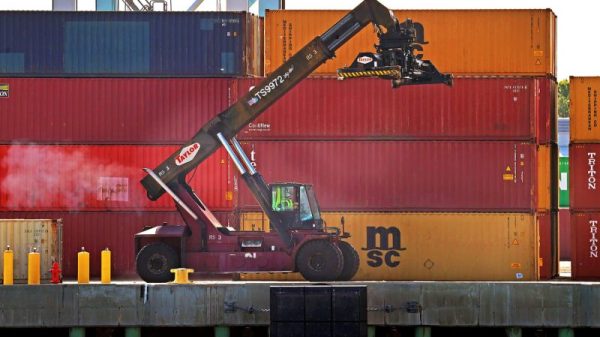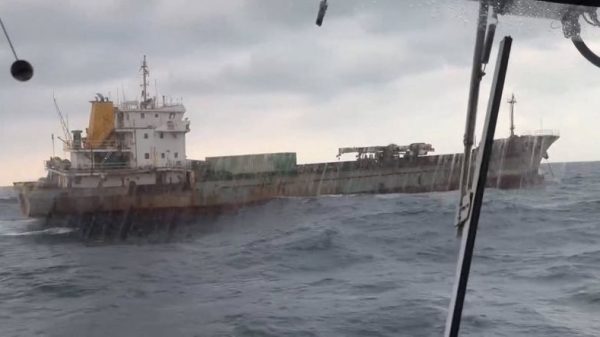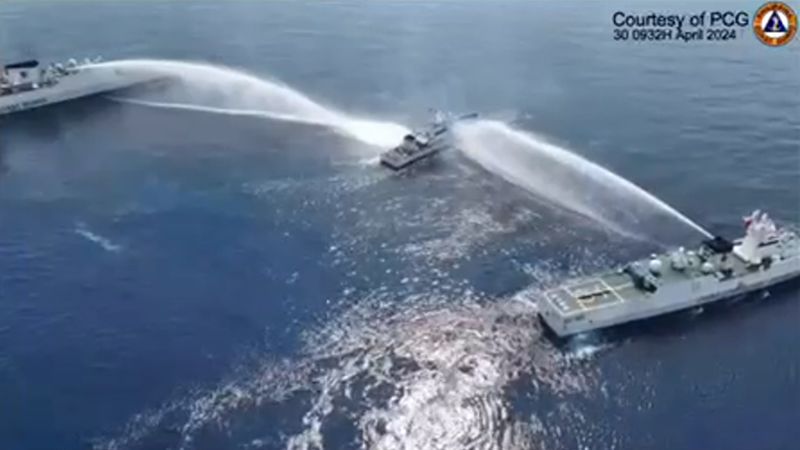The death of any Filipino citizen at the hands of another country in the South China Sea would be “very close” to an act of war, Philippines President Ferdinand “Bongbong” Marcos Jr. warned Friday as his nation faces increasingly fraught clashes with Chinese vessels in the South China Sea.
Marcos delivered the keynote speech of the Shangri-la Dialogue in Singapore, a regional gathering of global security leaders, including US Defense Secretary Lloyd Austin and his Chinese counterpart Adm. Dong Jun.
The Philippine president was asked by a member of the audience whether a “red line” would be crossed if Chinese Coast Guard ships, which have frequently deployed water cannons against Philippine vessels in recent months, ended up killing a Filipino sailor.
“If a Filipino citizen is killed by a willful act, that is, I think, very, very close to what we define as an act of war and therefore we will respond accordingly,” he replied.
“And our treaty partners, I believe, also hold that same standard,” he added.
China has increasingly pushed its territorial claims in the South China Sea, and China Coast Guard ships, reinforced by maritime militia boats, have been involved in a series of fraught clashes over the last year that has seen Philippine ships damaged and Filipino sailors injured by water cannon.
With confrontations increasingly souring the Beijing-Manila relationship, Marcos has sought out closer ties with the United States, with which the Philippines maintains a mutual defense treaty.
As part of that relationship, the US has gained increased rights to use Philippine military bases and the two allies have expanded bilateral military exercises. US officials consistently say the mutual defense pact is “iron-clad” and Philippine naval, coast guard and civilian vessels are covered by it.
That raises the prospect that should one of the many maritime clashes between Chinese and Philippine vessels in the South China Sea turn deadly, it could pile pressure on Washington to support its ally – and even drag the US military into a conflict.
“We already have suffered injury. But thank God we have not yet gotten to the point where any of our participants, civilian or otherwise have been killed,” Marcos said, referring to increasingly fraught clashes with China’s coast guard ships.
“But once we get to that point (a fatality)… we would certainly have crossed the Rubicon. Is that a red line? Almost certainly it is going to be a red line,” he said.
Key global waterway
China claims “indisputable sovereignty” over almost all of the 1.3 million-square-mile South China Sea – one of the world’s busiest waterways. But portions of it are also claimed by governments in Vietnam, Malaysia, Brunei and Taiwan as well as the Philippines.
In 2016, in a case brought by the Philippines, an international tribunal in the Hague ruled that China’s claim to historic rights to the bulk of the sea had no legal basis.
But Beijing has rejected the tribunal’s ruling and continued its military buildup, with many features lying hundreds of miles away from China’s mainland. It also maintains a large presence of coast guard and fishing vessels – which has frequently stoked tensions with its neighbors.
Marcos addressed the dispute multiple times in his speech.
“Illegal, coercive, aggressive, and deceptive actions continue to violate our sovereignty, sovereign rights, and jurisdiction,” he said, adding that the Philippines would defend it’s sovereignty to “the last square millimeter.”
“The life-giving waters of the West Philippine Sea flow in the blood of every Filipino. We cannot allow anyone to detach it from the totality of the maritime domain that renders our nation whole,” he added.
In the past week, Marcos has been raising concerns over a new Chinese policy that give its coast guard new powers of detention in Chinese-claimed areas of the South China Sea, including areas that lie within the Philippines Exclusive Economic Zone.
Meanwhile, the Philippine Navy said it is prepared to protect the rights of Filipinos and would be increasing patrols in the South China Sea, including the areas of contested sovereignty, according to the PNA.
A Chinese Foreign Ministry spokesperson said earlier this week that the new regulations are “in line with common international practices.”
“As long as there is no illegal behavior by any individual or entity, there is no need to worry,” spokesperson Mao Ning said.
“What I want to emphasize is that it is not China but the Philippines that has frequently escalated the situation in the South China Sea,” Ning added.
In his speech Marcos also warned that growing rivalry between the United States and China was impacting the entire Asia-Pacific region.
“The strategic competition between China and the United States is permeating the evolving regional landscape. This rivalry is constraining the strategic choices of regional states. This contest is exacerbating flashpoints, it has created new security dilemmas,” Marcos told delegates.
“The continued stability of this region requires China and the United States to manage that rivalry in a responsible manner,” he added.







































